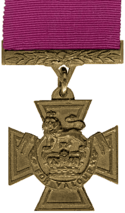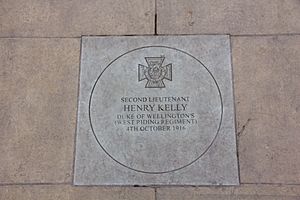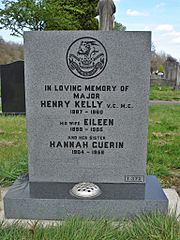Henry Kelly (VC) facts for kids
Quick facts for kids
Henry Kelly
|
|
|---|---|
 |
|
| Born | 10 July 1887 Collyhurst, Lancashire, England |
| Died | 18 January 1960 (aged 72) Prestwich, Lancashire, England |
| Allegiance | |
| Service/ |
Irish National Army Spanish Republican Army |
| Years of service | 1914–1920,1922–1923,1936, 1939–1944 |
| Rank | Major |
| Unit |
|
| Battles/wars | |
| Awards |
|
Major Henry Kelly was a very brave soldier from England. He was born on July 10, 1887, and passed away on January 18, 1960. He received the Victoria Cross (VC), which is the highest award for bravery in the face of the enemy for British and Commonwealth forces. He also earned the Military Cross (MC) and a Bar to that medal, meaning he received it twice.
Kelly was a temporary second lieutenant in the 10th Battalion, The Duke of Wellington's (West Riding) Regiment during World War I. He received his Victoria Cross in 1916. He also earned other important military awards from Belgium, France, and Spain for his courage.
Contents
Henry Kelly's Early Life and Military Start
Henry Kelly was born in Collyhurst, Manchester. He was the oldest of 10 children. His father passed away in 1904. Henry went to St Patrick's School and Xaverian College in Manchester.
Before joining the army, he worked as a sorting clerk at the post office. He also trained with the 'Manchester Royal Engineers territorial Regiment'. When he was 27, on September 5, 1914, he joined the Queen's Own Cameron Highlanders. He then moved to the Manchester Regiment. He quickly became a lance corporal and then a sergeant major. By May 1915, he was made a second lieutenant in the Duke of Wellington's Regiment.
Why Henry Kelly Received the Victoria Cross

On October 4, 1916, when Henry Kelly was 29, he showed amazing bravery during a battle at Le Sars, France. This act earned him the Victoria Cross. He also received the Belgian Croix de guerre and the French Médaille militaire.
The official description of his bravery said:
For most conspicuous bravery in an attack. He twice rallied his company under the heaviest fire, and finally led the only three available men into the enemy trench, and there remained bombing until two of them had become casualties and enemy reinforcements had arrived. He then carried his Company Sergeant Major, who had been wounded, back to our trenches, a distance of 70 yards, and subsequently three other soldiers. He set a fine example of gallantry and endurance.
This means he bravely gathered his soldiers twice under heavy gunfire. He then led just three men into the enemy trench. He kept throwing bombs until two of his men were hurt and more enemy soldiers arrived. After that, he carried his wounded Company Sergeant Major 70 yards back to safety. He also helped three other injured soldiers. His actions showed incredible courage and strength.
Receiving the Military Cross
In June 1918, Captain Kelly was fighting in Italy on the Asiago Plateau. He led a successful surprise attack on Ave during the night of June 21-22. For this brave action, he was given the Military Cross.
The award citation stated:
For conspicuous gallantry and devotion to duty at Ave, on the night of the 21/22nd June, 1918, when in charge of a company and a half in a raid. Despite a bright moon, he successfully assembled his party and attacked, killing a large number of the enemy and capturing thirty-one prisoners and two machine-guns. His gallantry and fine leadership were largely responsible for the success of the raid.
This means he bravely led his soldiers on a raid, even though the bright moon made it risky. He successfully gathered his team and attacked. They captured many enemy soldiers and two machine guns. His courage and leadership were key to their success.
Earning a Bar to the Military Cross
Kelly continued to show bravery in battles near the Piave River. On October 27, 1918, during the Battle of the Piave River, he led another successful attack across the river. Because of this, he received a Bar to his Military Cross. This means he earned the Military Cross a second time.
The citation for this award said:
On the 27th October, 1918, in the attack in the enemy positions across the Piave, he led his company with greatest dash and gallantry to the capture of all its objectives. His coolness and utter disregard of danger under heavy fire of all description inspired all ranks, and by his skillful leadership his company succeeded in taking many machine-guns and several hundred prisoners.
This shows that he led his company with great energy and bravery. He helped them capture all their targets. He stayed calm and ignored danger, which inspired all his soldiers. His smart leadership helped his company capture many machine-guns and hundreds of prisoners.
Henry Kelly left the army in 1920. He had been promoted to the rank of Temporary Major and was in charge of a rest camp in France.
Henry Kelly's Life Between the World Wars
After World War I, Henry Kelly continued his military service. From 1922 to 1923, he was part of the Irish National Army during the Irish Civil War. Later, in 1936, he joined the International Brigades. These were foreign volunteers who fought against Fascists in the Spanish Civil War. There, he was given the rank of Commandante General and received the Grand Laurelled Cross of San Fernando from Spain.
When World War II began in 1939, Henry Kelly was 52 years old. He rejoined the British army as a lieutenant in the Cheshire Regiment. For a few months, from October 1943 to February 1944, he managed the District Claims office in London. He was later officially criticized for an expense claim. After this, he resigned from the army and went back to working for the post office.
Later Life and Legacy
Henry Kelly continued to work for the post office. He lived in Wythenshawe, Manchester. After a long illness, he passed away on January 18, 1960, at Prestwich Hospital. He was buried in Southern Cemetery, Manchester.
Where to See Henry Kelly's Medals
Henry Kelly's Victoria Cross medal is on display at The Duke of Wellington's Regimental Museum. This museum is located inside the Bankfield Museum in Halifax, West Yorkshire, England.
 | Audre Lorde |
 | John Berry Meachum |
 | Ferdinand Lee Barnett |


